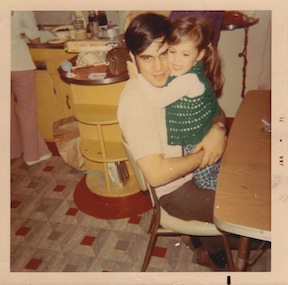is the word 'diary' better than the word 'blog'? probably not.
-----------------------------------------------------------------------------------------
anchors away.

There is something phenomenologically strange about the loss of a parent that nothing can prepare you for in advance.
(Of course, I realize that to most of you �phenomenologically� sounds like a nonsense word someone made up for a song on Sesame Street. Hence the following short definition.)
Phenomenology is a branch of philosophy concerned with human experience. So, instead of telling us why things are how they are using scientifically provable facts, it seeks to describe for us (or help us describe for ourselves) what it is like to be the kind of being who inhabits a body, lives in a world with others, and can�t avoid interacting with various other kinds of beings, living and not. Sometimes what is meaningful about being that kind of being cannot be described for us by a regime of strict factuality.
For instance, here�s a description of insomnia that uses a phenomenological approach.
So when I say that there is something phenomenologically strange about the loss of a parent, I mean the following. Of course it is the order of the world that parents die before their children. Science could tell us why that is so, as could common sense. It is how things are, most of the time. And it is even how things ought to be�it is a preferable state of affairs to its main alternative. But what is strange is how wrong it feels. Something about the world without my father in it feels deeply wrong. And that remains true no matter how much scientific fact or practical reality intrudes into my thinking.
It�s as if there had always been, unbeknownst to me, some animating force in the world that formed a background against which everything else either made sense or did not. It wasn�t that I was accustomed to viewing the world through the lens of �what would dad do,� or even that I asked his advice on things very often (I tend, for better and worse, to be fairly self-sufficient about decision-making). So my daily lived experience wasn�t in any strong sense guided by the aliveness of my father.
But in fact it was. What I�m describing isn�t a regret, something simple like wishing I had done something differently. Instead I�m left with a somewhat disorienting relationship to a world that became different when one person ceased to be a part of it. Of course, we all know that�s what loss does�someone goes absent from the world and those left behind feel disoriented. But there�s something about this loss in particular that is harder to describe. I suppose it�s like waking up from 45 years of thinking you were freely floating when all along you had an anchor, the presence of which you couldn�t be aware of until it wasn�t there anymore.
All of this sounds so common, like, these are things people say about death and loss. I suppose part of what is profound about the loss is how it feels like nothing else you�ve ever heard of, and then every set of words used to describe it turns it into something way too recognizable.
It�s not that I can�t go on or that I�m not doing well, etc. It�s just a very strange feeling�static in the background or a subtle change in scenery�like someone put a different screen on the lens of the world, and now I have to figure out how to look at everything again.
3:29 p.m. - May 12, 2012
Tom Pollock Sr. - 2012-05-12 22:22:17
Very provocative. I'm now speculating about my anchors. And trying to imagine the disorientating feeling of viewing the world of phenomena without a body at all.
-------------------------------
Evany - 2012-05-12 22:38:42
I love that you're writing about this stuff, though I so hate the reason behind it.
-------------------------------
-----------------------------------------------------------------------------------------
|
|
